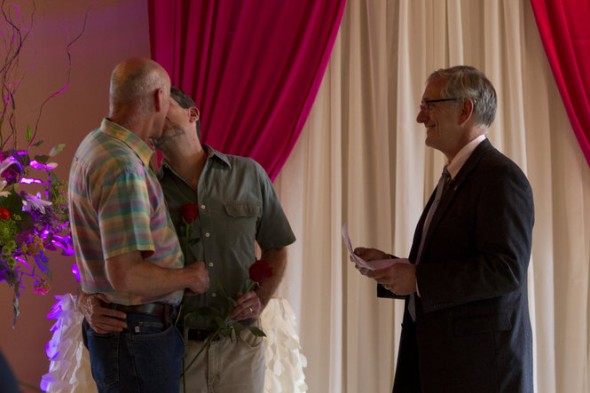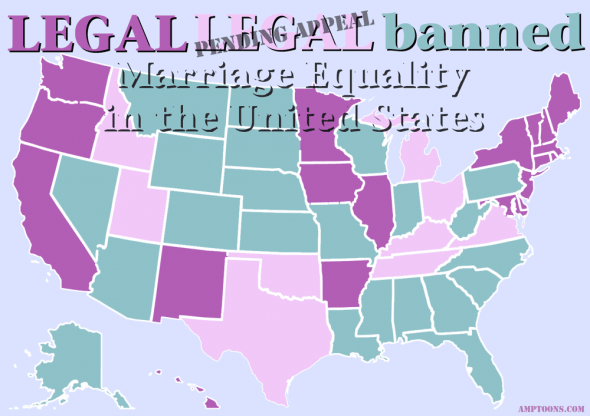
Several couples were married immediately following the ruling that struck down Oregon’s prohibition of same-sex marriage. Portland Mayor Charlie Hales performed the ceremony for Bert Boehm (left) and Richard Glenn. Beth Nakamura/ The Oregonian
Earlier today – ten years and a day after Goodridge legalized same-sex marriage in Massachusetts – Oregon District Judge Michael McShane overturned (pdf link) Oregon’s gay marriage ban, ruling that it denies same-sex couples their Constitutionally guaranteed equal protection of the law. This is the 17th court win for marriage equality in a row since the Supreme Court’s Windsor decision. In this case, there will be no appeal (the Oregon government doesn’t want to appeal, and NOM’s late request to intervene has been rejected), and happy couples are already getting licenses just a few miles from where I type.
Judge McShane’s opinion contains no surprises – it’s pretty similar to other decisions we’ve all read, including his dubious rational for ignoring the ways that Oregon’s gay marriage ban discriminated based on gender. (See here for more on that).
What does stand out is the conclusion of Judge McShane’s opinion, which is unusually heartfelt for a court ruling:
I am aware that a large number of Oregonians, perhaps even a majority, have religious or moral objections to expanding the definition of civil marriage (and thereby expanding the
benefits and rights that accompany marriage) to gay and lesbian families. It was these same
objections that led to the passage of Measure 36 in 2004 [banning same-sex marriage in Oregon]. Generations of Americans, my own included, were raised in a world in which homosexuality was believed to be a moral perversion, a mental disorder, or a mortal sin. I remember that one of the more popular playground games of my childhood was called “smear the queer” and it was played with great zeal and without a moment’s thought to today’s political correctness. On a darker level, that same worldview led to an environment of cruelty, violence, and self-loathing. It was but 1986 when the United States Supreme Court justified, on the basis of a”millennia of moral teaching,” the imprisonment of gay men and lesbian women who engaged in consensual sexual acts. [citations omitted] Even today I am reminded of the legacy that we have bequeathed today’s generation when my son looks dismissively at the sweater I bought him for Christmas and, with a roll of his eyes, says “dad … that is so gay.”It is not surprising then that many of us raised with such a world view would wish to protect our beliefs and our families by turning to the ballot box to enshrine in law those traditions we have come to value. But just as the Constitution protects the expression of these moral viewpoints, it equally protects the minority from being diminished by them.
It is at times difficult to see past the shrillness of the debate. Accusations of religious bigotry and banners reading “God Hates Fags” make for a messy democracy and, at times, test the First Amendment resolve of both sides. At the core of the Equal Protection Clause, however, there exists a foundational belief that certain rights should be shielded from the barking crowds; that certain rights are subject to ownership by all and not the stake hold of popular trend or shifting majorities.
My decision will not be the final word on this subject, but on this issue of marriage I am struck more by our similarities than our differences. I believe that if we can look for a moment past gender and sexuality, we can see in these plaintiffs nothing more or less than our own families. Families who we would expect our Constitution to protect, if not exalt, in equal measure. With discernment we see not shadows lurking in closets or the stereotypes of what was once believed; rather, we see families committed to the common purpose of love, devotion, and service to the greater community.
Where will this all lead? I know that many suggest we are going down a slippery slope that will have no moral boundaries. To those who truly harbor such fears, I can only say this: Let us look less to the sky to see what might fall; rather, let us look to each other … and rise.
At the time of the Windsor decision, I thought that the fight for same-sex marriage was about to enter a slow period – that the low-hanging fruit had all been picked other than Oregon and a couple of other states, and after that things would go slow and maybe take decades. I’ve seldom been so pleased to be wrong.




Ooo, nice graphic.
And congrats; welcome to the club! When we finally got SSM in my state, the cell phone lines were immediately jammed all around the capital; no calls could go in or out. And yes, this prompted a lot of “What’s the point of same-sex marriage if there’s no reception?”
PDF link is broken.
Link has been fixed. Thanks!
Yay for Oregon–and, now, Pennsylvania as well!
Why is the mayor better dressed than the participants? C’mon people, it’s your WEDDING. Dress it up a little.
Pennsylvania’s law was declared unconstitutional and the governor stated that he would not appeal.
The Judge who ruled Pennsylvania’s law unconstitutional is the same judge who rules in favor of science and the separation of church and state in the Kitzmiller vs Dover trial.
The next time some far right conservative accuses me of hating all Republicans I’m going to say, “Not true. I like Judge John E. Jones. He is my kind of Republican.”